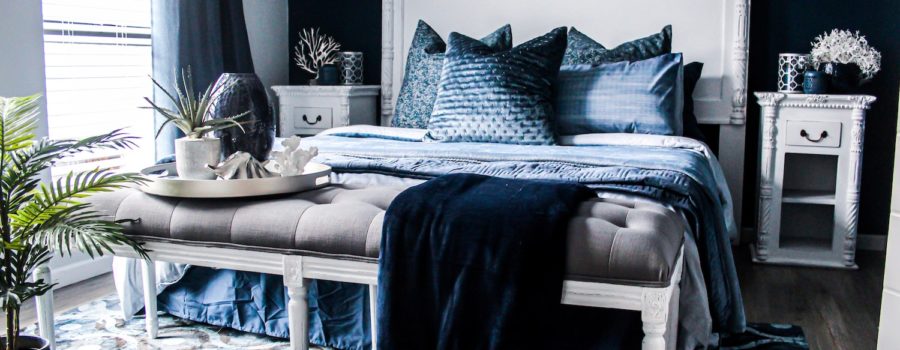You already know that sleep is important. We’d imagine that every person has experienced the way a lack of sleep can wreak havoc on your day. Suddenly, things that aren’t a very big deal feel gargantuan. You’re irritated. You can’t focus. It’s a drag, really.
Turns out, not getting enough sleep isn’t just bad for how you feel that day. It also links directly to your mental health. Plus, insufficient and low-quality sleep heightens your risk of a number of serious physical health conditions. All told, sleep matters. Still, even when you know that, actually getting enough sleep is a whole different issue. The good news? You can make some changes to help. Specifically, you can design your bedroom for sleep.
We rounded up five of our favorite tips to help you optimize your bedroom for sleep. These come straight to you from Kait Cantrell, our Program Director and Wellness Coordinator. Implement her suggestions to drift off more easily and support your ability to stay asleep through the night.
Create a calming space
If you want to be able to fall asleep the moment your head hits the pillow, think about the things you see as you get into bed. Remember the book Goodnight Moon? It turns out, that book isn’t a classic just because we all like it. It resonated with kids and adults alike because it mimicked how we approach sleep, often by looking around the room.
If you’re looking around and seeing clutter, stimulating imagery, or anything else that elevates your energy levels, sleep might be elusive. Work to create a zen space in your bedroom. That means keeping it clean and calm. If you’re messy, create a space where you can hide the mess, whether that’s inside a closet that shuts or in a bin you can roll under your bed.
Then, look at your decor choices. When possible, make swaps for soothing colors (like cool tones and neutrals). Choose art that makes you feel calm. Make your bedroom feel safe, centered, and restful, and you’ll feel more safe, centered, and restful when you climb under the covers.
Cool it down
Science says we sleep better in a cooler room. Keep that thermostat below 67° F for the best rest. If your room is hot or stuffy, consider adding a fan. The noise from the fan can help you get better sleep, too.
Consider white noise
Which brings us to our next point: consider your soundscape. If you’re a light sleeper and you find yourself regularly waking up throughout the night, you might want to add some white noise to your room. This helps you tune out the outside noises that would otherwise interrupt your sleep.
White noise could be anything from the aforementioned fan to a sound machine to a Spotify playlist of nature sounds. Play around to find what works for you.
Make sure your bed is comfy
This might seem like a no-brainer, but a surprising number of us are tossing and turning on lumpy mattresses and pancaked pillows. Most of us spend more time in bed than anywhere else. This is a place where it’s worth the investment. A mattress can be pricey, but consider upgrading your pillows and bedding to start. Keep making changes until you feel truly comfortable in bed. Considering the mental and health ramifications of sleep, it’s worth every penny you spend.
Go dark
Light signals your brain that it’s time to be awake. For better sleep, make sure your bedroom is dark and can stay that way. Get some blackout curtains if you need them.
The sun and light bulbs are far from the only source of light in most of our bedrooms. Don’t forget about your electronics. They’re particularly problematic because their blue light can block your body’s natural sleep processes. Move electronics out of the bedroom and try to stay off them an hour before bed. Or, at the very least, activate Night Mode on your phone and stash it in a drawer when you’re ready to fall asleep.
We hope these tips help you get amazing rest night after night. And we’re here to help make your days better, too. If you’re interested in therapy, counseling, art therapy, alternative healing, group work, or any of our other mental health services, we’d love to talk. Call or email our team at the Ventura Counseling & Wellness Center today.





